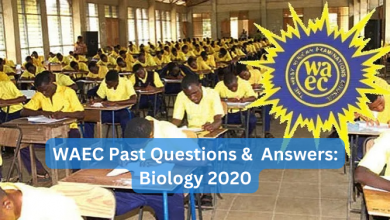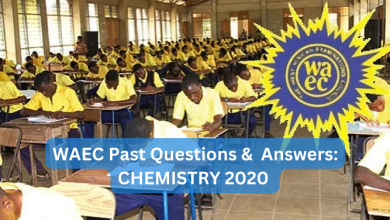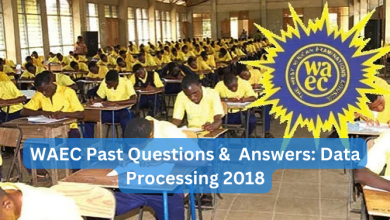WAEC Past Questions & Answer: GOVERNMENT 2018

Welcome to our WAEC past question and answer series. In this post, we will be sharing Government 2018 past questions and their answers for various subjects. Stay tuned enjoy while learning.
1. A government performs the following functions except?
A. safeguarding life and property
B. maintaining law and order
C. providing all the needs of its citizens
D. providing basic welfare needs
2. A political system in which government controls every aspect of a citizens life is?
A. feudalism
B. monarchy
C. democracy
D. totalitarianism
3. A political system in which the state owns and controls the major means of production is known as?
A. feudalism
B. socialism
C. fascism
D. capitalism
4. Communist governments aim at distributing goods and services according to?
A. gender and class
B. loyalty to the party
C. need and ability
D. work and residence
5. The theory of seperation of power is associated with?
A. Jean Bodin
B. Baron de Montesquieu
C. A.V Dicey
D. J.J Rousseau
6. The basic purpose of setting up a state is to?
A. maintain law and order
B. protect foreign interest
C. Promote development
D. provide social facilities
7. The process of taking part in the selection of leaders in a country is political?
A. socialisation
B. participation
C. interaction
D. culture
8. By comparison, a state is?
A. less permanent than a government
B. more permanent than a government
C. more changeable than a government
D. equally permanent with a government
9. In modern democracy, a government is?
A. a contract between the rulers and the ruled
B. a preserve of the political party in power
C. monopoly of the ethnic groups in the majority
D. alternation of power between the minority and majority tribes
10. The rule of law can be limited by?
A. power
B. state of emergency
C. legitimacy
D. checks and balances
11. The principle of seperation of power becomes meaningful when it is linked with the concept of?
A. the certainty of the law
B. checks and balances
C. legality of the law
D. judicial independence
12. Which of the following doesn’t militate against representative government in West Africa.
A. electoral irregularities
B. coup d’ etat
C. gagged media
D. universal adult suffrage
13. Those who believe in democracy and good governance are opposed to a single party system because?
A. encourages weak leadership
B. does not ensure national unity
C. curtails personal liberty
D. encourages divisiveness
14. The fundamental law of a country refers to its?
A. acts of parliament
B. conventions
C. constitution
D. judicial precedence
15. A country’s constitution could be derived from the following sources except?
A. judicial precedents
B. customary sources
C. statutory sources
D. party manifestoes
16. Planning and formation of government policies are first initiated at?
A. cabinet meetings
B. media houses
C. political rallies
D. open forum
17. Which of the following is the primary function of a parliament
A. impeachment of the president
B. making of laws
C. ratifying international treaties
D. acting as an electoral college
18. Judicial review is a mechanism for checking?
A. arbitrary use of power
B. irresponsible journalism
C. electoral malpractices
D. military adventures
19. In a parliamentary system of government, the legislature and executive are fused to ensure
A. supremacy of the ruling party in administering the state
B. smoothness in the administration of the state
C. the constitution is read in parliament at all time
D. the judiciary consults parliament before ruling on cases
20. A country with homogeneous societies and a small population is suitable for the establishment?
A. a unitary state
B. a nation state
C. a federal state
D. an autonomous state
21. Which of the following factors usually leads to the collapse of a confederal state
A. weak central government
B. absent of a confederal parliament
C. ill equipped armed forces
D. absence of a ceremonial head of state
22. In the presidential system of government, the chief executive is responsible to the?
A. judiciary
B. monarch
C. electorate
D. senate
23. A federal government is a form of?
A. decentralisation
B. centralisation
C. confederation
D. revolution
24. Which of the following alternatives is a feature of a federation
A. unwritten constitution
B. unicameral legislature
C. supremacy of the constitution
D. right to secede
25. To preserve individual liberties, the judiciary should?
A. consist of honest and impartial judges
B. be appointed by the executives
C. be prosecuted for judgement against the executive
D. participate in partisan politics
26. Citizens can seek redress against injustice from the state through the?
A. ombudsman
B. head of civil service
C. civil service commission
D. titular executive
27. Which of these functions is performed by both political parties and pressure groups?
A. interest aggregation and articulation
B. source of mediation in a state
C. provision of specialised information
D. seeking to manage the affairs of the state
28. Which of these is not a source of revenue for political parties?
A. dues
B. grants
C. tolls
D. donations
29. Pressure groups seek to influence the polices of government.
A. to the advantage of their members
B. so that all citizens can benefit
C. to suit the manifestos of political parties
D. to conform with electoral act
30. Which of the following agencies helps the most in shaping public opinion?
A. pressure groups
B. mass media
C. college and universities
D. peer groups
31. Public opinion can be measured through all of the following except the?
A. imposition of laws without any debate
B. conduct of opinion
C. general review
D. holding of referendum in a state
32. An electoral system which allows party members to elect candidates for elective offices is called?
A. by election
B. primary election
C. general election
D. direct election
33. On which of the following grounds can a citizen abstain from voting
A. religion
B. education
C. wealth
D. status
34. Indirect election is best described as?
A. only women electing legislators
B. the citizenry electing legislators
C. electoral college electing legislators
D. only adults electing legislators
35. The class that controls and supervises the activities of the executive class in the civil service is?
A. clerical class
B. manipulative class
C. professional class
D. administrative class
36. The agency responsible for investigating allegation of maladministration and punishing offending career officers in the executive is the?
A. federal character commission
B. ethics commission
C. judicial commission
D. public/civil service commission
37. The anonymity of civil servants means that they should not be?
A. prosecuted for any professional misconduct
B. disciplined because of their expertise
C. above the law of the land
D. praised or blamed publicly
38. The following were limitations imposed on traditional rulers under colonial rule except?
A. were not permitted to raise armed forces
B. had no power to impose tax
C. had no power to install or dispose a chief
D. were no longer spiritual heads of the people
39. A system of administration which allowed traditional rulers to rule their people under the supervision of the British officials in West Africa is?
A. divide and rule
B. colonisation
C. indirect rule
D. assimilation
40. Local government is established in order to?
A. bring government nearer to the people
B. build churches and mosque
C. curb corruption in the society
D. promote political apathy
41. One reason for the adoption of indirect rule in British West Africa was?
A. availability of British officials
B. to ensure justice
C. inadequate finance
D. to assimilate the indigenes
42. Which of the following policies replaced assimilation?
A. indigent
B. loi cadre
C. association
D. indirect rule
43. Which of the following is a reason for the failure of the assimilation policy in French West Africa?
A. the change in the name of their culture
B. the refusal of Africans to be culturally colonised
C. the democratic policy of the french
D. bribery of the opinion leaders by the french
44. Nationalism prior to the second world war was led by?
A. educated elites and chiefs
B. chiefs and elders
C. aggrieved cocoa farmers
D. African merchants
45. Which of the following is not a factor leading to military intervention in west African states?
A. excessive control of public enterprise
B. falsification of election results
C. mismanagement of the country’s economy
D. corruption in high places
46. One of the problems of military administration in West Africa is that soldiers
A. are representatives of the people
B. lack discipline
C. are not well organised
D. are not trained for governance
47. In order to promote democracy and good governance, the commonwealth of Nations
A. prosecutes leaders who commit atrocities at the international criminal court
B. organises seminars and training programs on technical assistance to members
C. sanction members who do not pay their dues
D. sponsors election observer teams to monitor the conduct of elections.
48. Foreign policy of a country could be influenced by?
A. personality of political leader
B. number of schools in a country
C. number of ministers in a country
D. national
49. Which of the following is not a problem faced by ECOWAS
A. financial security
B. political instability
C. larger market
D. colonial heritage
50. The united nation organisation (UNO) is primary regarded as successful because
A. its members continue to increase
B. of its control of outbreak of another world war
C. all member countries have veto power
D. more member countries acquire more nuclear power
Answers To Questions
- C
- D
- B
- C
- B
- A
- B
- B
- A
- B
- B
- D
- C
- C
- D
- A
- B
- A
- B
- B
- A
- C
- B
- C
- A
- A
- A
- C
- A
- B
- A
- B
- D
- C
- D
- D
- D
- D
- C
- A
- D
- C
- B
- A
- A
- D
- D
- A
- A
- B





